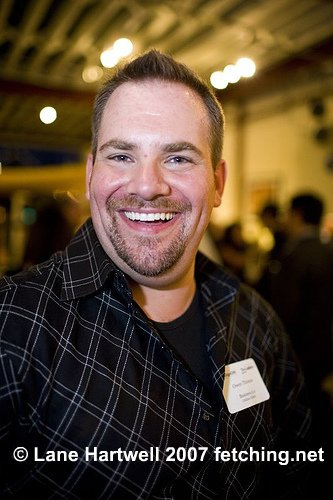Rule 1 for Collaborative Media: Ask First
Here’s what happened, as far as I can tell.
Lane Hartwell is a fantastic photographer. She recently went full-time with her photography career.
A few weeks ago, an acapella group called the Richter Scales did a parody of Billy Joel’s song, “We Didn’t Start the Fire,” with new lyrics about the internet. They made a music video and put it on YouTube. The video was a slideshow of photos, all taken from the internet, to illustrate their song.

The photo of Owen Thomas, by Lane Hartwell, used in the Richter Scales video. (Use of the photo here, in a story about the photo, is the very definition of Fair Use.)
One of the photos used in the video was of Owen Thomas from Valleywag, shot by Lane Hartwell, and published in Wired News. Lane still owns the copyright to this image, and it was used without her permission.
I have no firsthand knowledge of what happened next, but I’ve been through it myself many times, so allow me to paraphrase: The photographer says, Hey, you don’t have my permission to use my work. And the person who grabbed the photo says, It’s the internet! Suck it!
What’s different about this case, however, is it appears that Lane filed a copyright complaint with YouTube. The DMCA says companies that host user-submitted content are not liable, so long as they act on copyright infringement claims. So YouTube did what they have to do to maintain compliance with the law: they took the video down.
Then Wired News posted about it and a bunch of blowhards blew it all out of proportion and all hell broke loose: bloggers became lawyers all of a sudden, with everyone having an opinion about fair use, parody, the value of photos online, and the content of Lane Hartwell’s character. Unfortunately, this story is not about any of those things.
Here’s what this story is about, and this point seems to have been thoroughly missed by everyone involved: Ethical practices in social media.
The Richter Scales had a funny song. (Cool!) They decided to make a video and put it on YouTube. (Smart!) Then they decided to take photos from online sources for their video. (Dumb.) They did not contact any of those photographers, get their permission, or give them credit in the final product. (Really dumb.) And when one of the photographers contacted them, they obviously did not treat her with the proper respect. (Really, really dumb.)
The Richter Scales guys are not evil, they were just lazy. Contacting all those photographers would have been really time-consuming. But it was the right thing to do, and they didn’t do it. This kerfuffle is their fault, not Lane’s.
Had they simply contacted all the photographers, told them about their project, asked nicely for their permission, and given them credit in the final product, 99% of them would have said yes. In fact, most of them probably would have been proud, linking to the result, and helping promote it. And the few that didn’t want to participate could have politely declined, without any drama.
Or they could have limited their photo selection to Creative Commons-licensed photos, listed by their creators as available for exactly this kind of project. (Of course, that would have required crediting the photos, too.)
But they didn’t do any of those things. They took creative works for which they did not have permission, and made a derivative work. That is a clear copyright violation, and their video is gone from YouTube as a result.
As more attention is focused on social media, and people become more aware of the value of all that media, this kind of thing is going to come up a lot. It’s time that we develop some ethical practices for the creation of collaborative media. Simply asking for permission to use someone else’s work is a good place to start.
